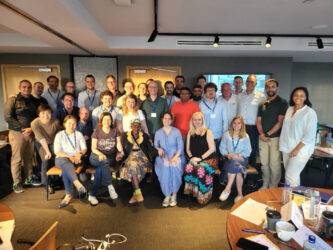
When Didier Bonnet co-authored a landmark study in 2014 on digital transformation, Tesla’s Model S was barely two years old and there were queues outside Apple stores for the hot new iPhone 6.
No wonder Bonnet, Affiliate Professor of Strategy and Digital Transformation at IMD, and his co-author George Westerman of the MIT Sloan School of Management, thought the time was ripe for an update. Their revised paper, ‘The New Elements of Digital Transformation’ has just been recognized as one of the 20 most popular of 2020 in the MIT Sloan Management Review.
So, what has changed over the past six years in terms of digitalization and business? Rather a lot, says Bonnet, whose latest research, as before, rests on extensive interviews with top executives at companies around the world.
Some key themes remain as ever, even if the details have altered. Executives still need to be ‘digital masters’, possessing both digital dexterity and leadership skills. The continuing importance of such individual attributes comes alongside a broader rise in prominence in companies of IT staff in general.
Leadership has become more crucial than ever amid myriad new challenges. The same applies to digital savvy, with the arrival in recent years of new technologies like artificial intelligence and the Internet of Things. Technological prowess is no longer a booster in abstract corners of a business, but counts across the board now. While some companies have embraced such thinking, many have not. And, most recently of all, the changes imposed by the Covid-19 pandemic have made digital transformation more important than ever, widening the gap between the most tech savvy companies and others.
Customer experience, highlighted in 2014, remains central, though here too many details have changed. Customer experience has become decisive in building brands and companies. Designing the customer experience, exploiting the wealth of real time data now available about customers and stimulating emotional engagement have each developed into major themes.
Improving internal operations remains vital, though here too significant developments have arisen in recent years. The automation of core processes has accelerated – just look at Amazon’s despatch warehouses. Once independent functions have also been increasingly connected and often made more dynamic, allowing broader oversight and boosting efficiency. And decision-making has become more data backed than ever.
The new study reveals employee experience has gained prominence, with Bonnet noting a range of developments from greater comfort with the use of robots to shifting skills requirements. Robots are not longer necessarily perceived as a threat to human capital, but rather as assistants in tiresome tasks, in a process dubbed augmentation by the authors.
Employees themselves are also experiencing a transformation, with more emphasis in many companies on providing staff with skills expected to be ever more important in future, and at the same time training workers to be more agile and adaptable via ‘multiskilling’.
More fundamentally, business models themselves are being transformed, partly because of growing awareness of the lurking dangers of disruption by innovative newcomers. Part of the response involves in creating ever more digital alternatives to a company’s traditional ways of doing business. Adding more information based services and even opening proprietary trading platforms to outsiders are further options.
But even when companies have established fully digital platforms, they cannot rest on their laurels. While such platforms are central to successful companies, they must be updated constantly to reflect the latest technological developments. For example, moving functions onto the cloud may not just boost efficiency, it also positions a company to be more agile and responsive to changes in future. Digital transformation, it seems, never sleeps.
Read the full article by Didier Bonnet and George Westerman in MIT Sloan Management Review: The New Elements of Digital Transformation.


